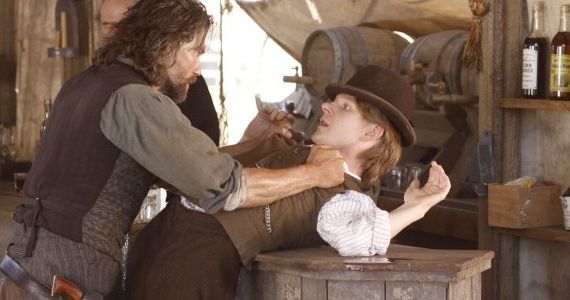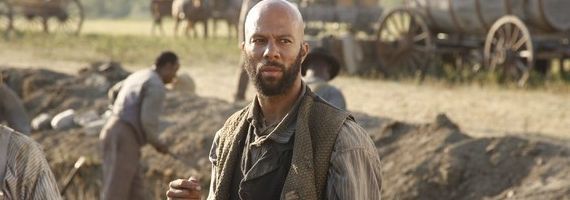When AMC announced it had picked up Tony and Joe Gayton’s television western Hell on Wheels, the news set off a string of speculative buys across the various other networks scrambling to reproduce AMC’s success, as was the case with Mad Men. After having viewed the complete first season of Hell on Wheels, however, the onslaught of pending westerns need not fret, the best is still waiting to be discovered because AMC has set the bar incredibly low.
Having previously written revenge flicks like Faster and The Salton Sea, it was of little surprise that the Gayton brothers would choose to begin the story of Cullen Bohannon (Anson Mount) by having his trek west be fueled with a thirst for vengeance. What is surprising is how quickly everyone – the writers and Mr. Bohannon – seemingly forgot the premise of the series. After the pilot, HoW quickly shifted gears into a hackneyed look at the United States’ expansion west and how the concept of “manifest Destiny” irrevocably altered the lives of everyone in its path.
This, in and of itself, would not have been an uninteresting avenue to explore – especially considering the bitter conflict of America’s Civil War is still a fresh memory, while the war’s larger, societal impact is still being felt and understood by those who consider themselves the architects of such a “destiny,” and those who have largely been caught under the boot of said progression.
Unfortunately for Hell on Wheels and its audience, there was little exploration going on in the ten episodes that comprised the program’s first season. Though the series seemed intent on delivering some sort of social commentary on the topics of race, class and gender equality, it generally did so with all the grace and subtlety of a large rock being thrown through a plate glass window. The result of which, forced the abandonment of not one possible storyline, but all of them – a point realized after the season’s final episode ‘God of Chaos.’
At first it seemed as though Hell on Wheels was deliberately telling a slow story in order to build toward an unexpected, or somehow grand climax. Instead, over the course of the season, it became obvious that HoW wasn’t just taking its time getting to where it was going, it actually had no idea where it was headed. The meandering storyline could have been forgiven had the guts of the series not delivered such maddeningly derisive content most of the time.
REVIEW
The alarming convenience of the storytelling comes to a head after Sgt. Harper – the supposed last man on Bohannon’s “to kill list” – is brought to Hell on Wheels by the Swede, so that he may testify to Bohannon’s supposed culpability in the death of the previous foreman. The last time we saw Harper it was episode 3, and the Sergeant was shooting Bohannon’s horse out from under him from a quarter-mile off and then scampering away into the woods. Now, it would be impressive if the Swede had simply bested Bohannon’s tracking skills by finding the elusive Sgt. Harper first, but the fact of the matter is, Bohannon never really bothered to look for him.
Harper’s presence in Hell on Wheels is intended to give the audience some notion of resolution because we’re all supposed to have been incredibly concerned with Bohannon’s quest for vengeance – though he’s not bothered by it much.
Between Bohannon looking for Harper and finding him, the rest of the episode concerns itself with Durant’s 40-mile celebration party, which basically sets up the status quo for next season.
Durant suspects Lily Bell (Dominique McElligott) of having feelings for Bohannon – which would likely come to a surprise to her, as she’s conveyed no such emotion either outright or indirectly this entire season – and wants Bohannon gone, so, despite cutting the Swede off at every turn in all previous episodes, Durant relents, and authorizes the Swede to do…whatever it is he wants to do with Bohannon.
Before he can see that pesky southerner pay for his crimes, the Swede falls victim to the McGinnes brothers, who, after taking Bohannon’s advice on dealing with the extortionist completely wrong, arrange a mob to tar and feather the lanky fellow with what looks to be piping-hot ink.
Oh, and Tom Noonan, as the Reverend Cole, once again brings the crazy to whatever roll he plays. Thank you, for your consistency, Tom Noonan.
By the end of it, Bohannon and the Swede are both on the run, Elam is left wondering if he’s made the right decision and Lily is ostensibly left to deal with Durant’s unmitigated pining and requests for her affection. And the audience is left wondering just what we were supposed to get from this story.
As mentioned above, the time period in which Hell on Wheels is set should, for most, be considered plum territory to explore, and yet much of that has been left largely untapped. In 10 episodes, the concern of nearly all characters of the program was the notion of whether or not the railroad would carry on past the illustrious 40-mile mark that Thomas Durant (Colm Meany) had been tasked to reach before the government dollars began to roll in. The expansion of a railroad could be interesting television, if this were a program about railroad expansion – or at least one that confined itself to such a singular thought – but Hell on Wheels isn’t that; it is not content to tell one story well when it can touch upon a myriad of topics without actually having anything interesting to say about any of them.
There was simply not enough mining of the notion that America’s expansion west was an undeniable push of modernity run by cold, mechanical ruthlessness that does not wish to stop and contemplate the destruction of another culture’s way of life. Instead, Hell on Wheels conveniently depicts the Native Americans as a bunch of guys who’re just not really getting this whole “locomotive” thing, and they’re basically getting in the way. For most of the season, the Cheyenne have largely been reduced to the role of poorly realized villains, and given none appear in the final episode, they are apparently minor ones at that.
More than the missed storytelling opportunities, however, the most egregious error with Hell on Wheels is that week-in-and-week-out the series exhibits some of the most deplorable dialogue ever uttered on an AMC program. It is the sort of dialogue that either assumes all of its characters are morons, or, worse yet, those viewing the program are. The script rams home the meaning of everyone’s words by following up a line of dialogue with an explanation of what was just said. Perhaps there would be more time for content and quality storytelling if everything weren’t said twice, and the actors were given the opportunity to infer further meaning through anything other than poorly written dialogue.
As it stands, Hell on Wheels has a long way to go before it can justify being on the same network as Mad Men, Breaking Badand The Walking Dead. With AMC readying season 2, lets hope the Gayton brothers enlist some help in the scripting department – otherwise there might not be an audience left for season 3.
-
Hell on Wheels returns to AMC in late 2012.



